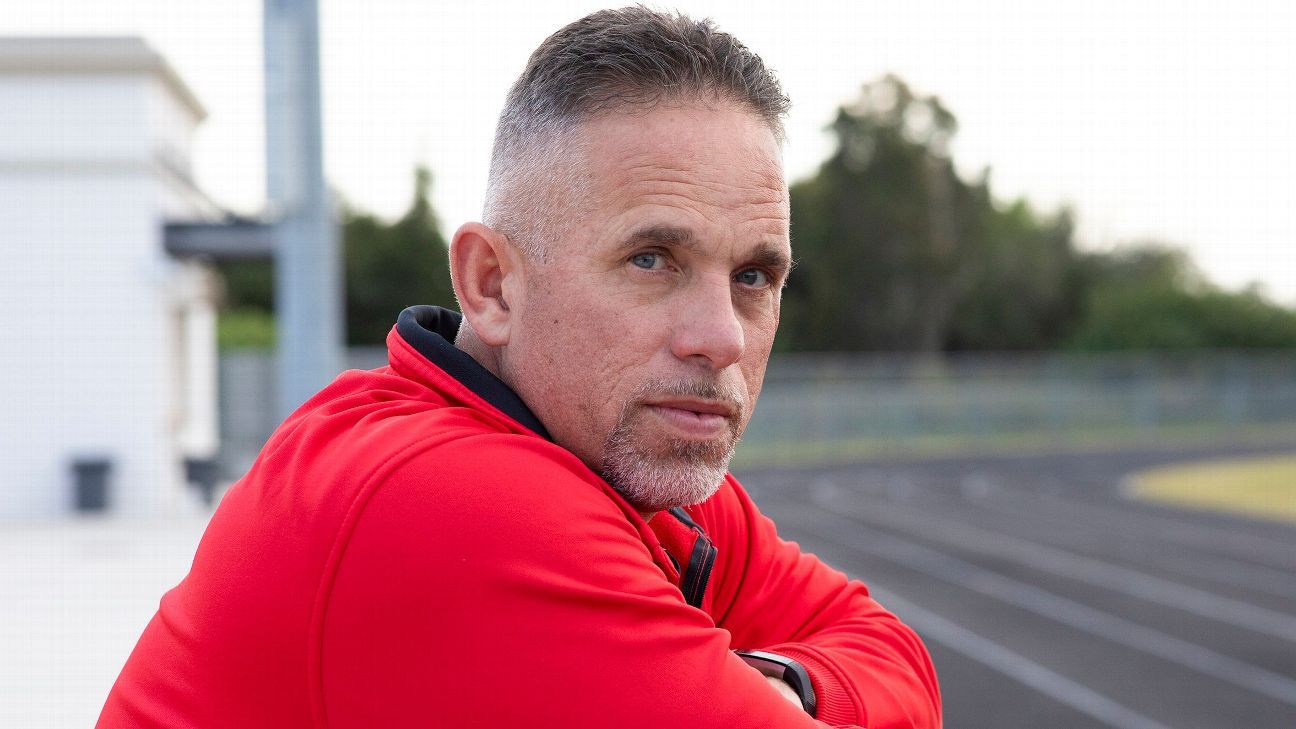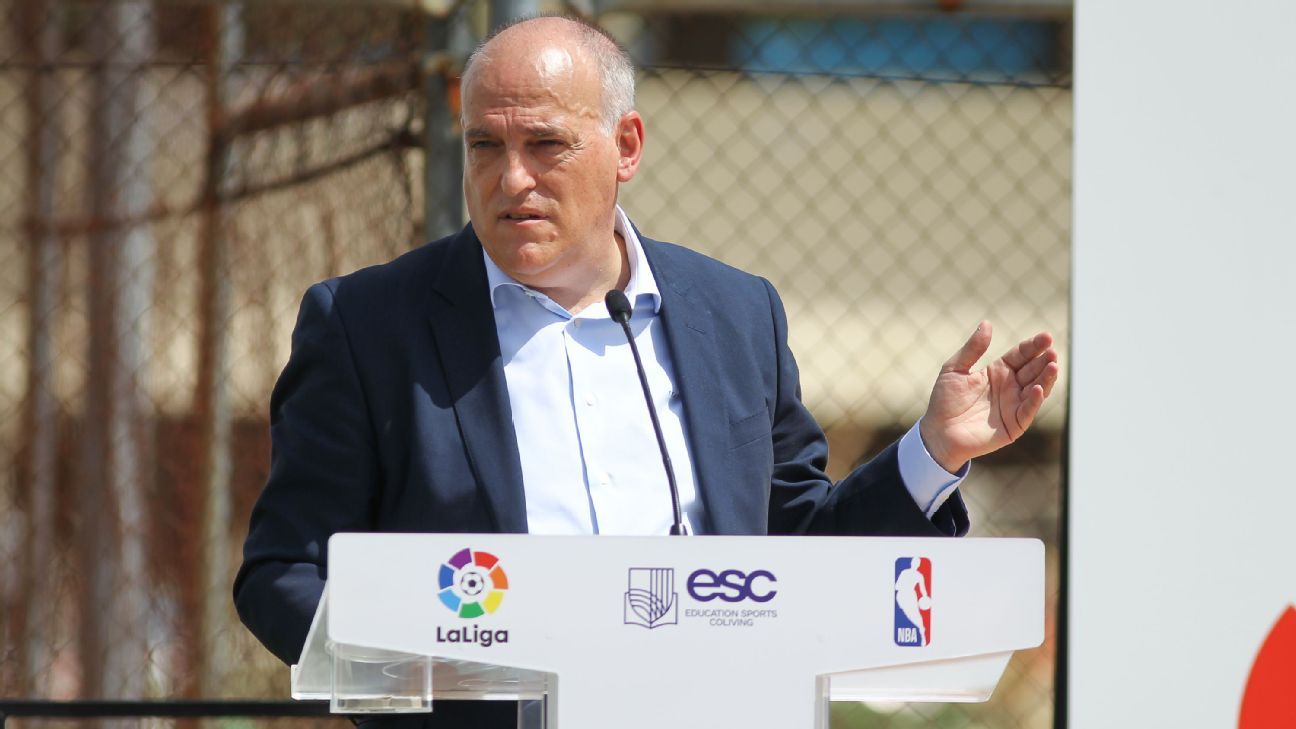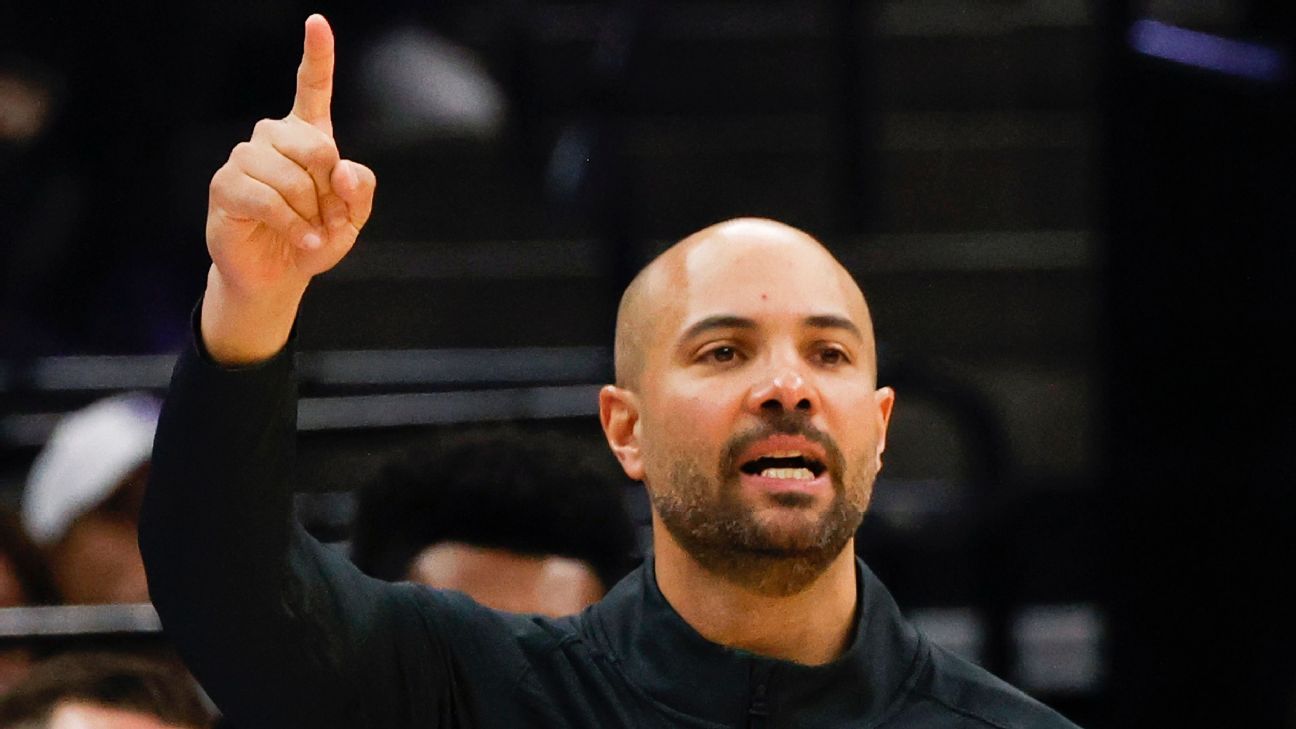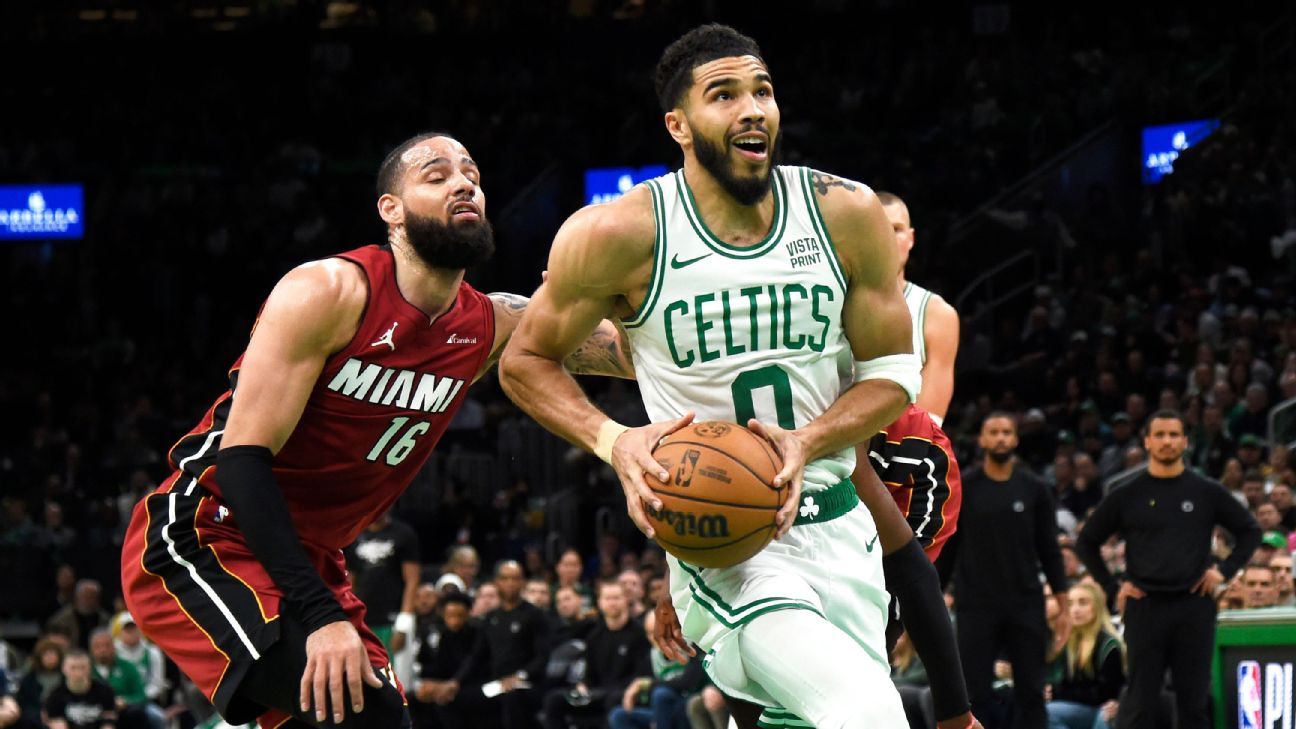
FORT MYERS, FLA. -- Willis May keeps reminders everywhere. A framed team photo sits behind his desk. So does a white mini helmet with an Eagles logo and the number 17 in the center, encased in a plastic cover. Resting on top, a black wristband with bold white letters spelling "Coach Feis." In his phone, a final text message to his best friend, asking, "Where's the shooter?"
There are more subtle reminders of the day at Marjory Stoneman Douglas High School that changed everything. The sound of balloons popping startles him. His new athletic director will not let anyone rattle May's doorknob or approach his office during lockdown drills. His mom asks him all the time, "Are you sleeping better?"
Willis May tells her he is, but he doesn't tell her much more. What he wants to say to her is finding peace is impossible. That he is racked with guilt. That he feels like he let his best friends and innocent students down. That yes, he is sleeping and yes, he is happier, but no, he will never be completely better.
At least, that is how he feels today, two years after a mass shooting at Stoneman Douglas left 17 people dead, including his two best friends -- assistant coach Aaron Feis and athletic director and wrestling coach Chris Hixon. May, the Stoneman Douglas head football coach at the time, put his own grief aside to coach his devastated players through the 2018 season.
Every day of the new school year, every football game under the Friday night lights, felt more exhausting than the next. May pushed forward because he needed his players to think everything would be OK, even though he felt the opposite. When the season ended, his own anguish reached such an agonizing level, May could think about only one thing: leaving.
So he did. Last spring, May made the heart-wrenching decision to leave Parkland, Florida, and move west across I-75 to coach at South Fort Myers High School. When he arrived, he found a program and players who needed him just as much as he needed them.
The move has allowed him to stop thinking, every single day, about the horrors of Feb. 14, 2018. But on the other hand, it has been impossible to completely block out that day and how it changed what it means to be Willis May, to be a resident of Parkland, to be a student or teacher or parent or administrator at Marjory Stoneman Douglas High School.
May wants to coach football, the way he has for more than 20 years, but he is now a mass shooting survivor, and with that comes complex, dueling emotions that are hard to accept, let alone understand. He needs to move forward, but moving forward feels selfish because 17 others cannot. He wants to turn South Fort Myers into a state champion, but he needs his experience coaching Stoneman Douglas to help. His new life does not exist without his old life, so he forces himself to remember when there are days he would rather forget.
Says May: "How do you get over it?"
THE SUN STARTS to set on a muggy October day in Florida. Gary May waits on the football field for his brother, with bags of red, white, silver and black spray paint cans on the back of a golf cart. He already has laid down the Wolfpack logo stencil at midfield. They need to paint the field, the same way they did at Stoneman Douglas.
Willis May emerges from his office inside the school building, tells Gary where to start, then grabs red paint and begins to go over the yard marks. South Fort Myers has a big game the next night against rival North Fort Myers, and the May brothers stay out here for four hours making sure the field looks perfect.
At South Fort Myers, Willis May inherited a proud, young football program. The school counts Kansas City Chiefs receiver Sammy Watkins and Minnesota Vikings safety Jayron Kearse among its football alumni. This program knows how to win. But when May arrived, he said, the program was in disarray. The locker room and weight room were a mess. Players had quit on their coach and one another during a 1-9 season in 2018, and the hostility among them had seeped into everything they did. Classmates and teachers made fun of them to their faces. May's job was to tear it down and build it back up, to rebuild and restore.
As he explains what he found here, it's clear he's not just talking about his program.
May never sought help after the shootings. He has not spoken with a therapist. He rarely shares what happened. His wife, Melissa, tells him he has survivor's guilt. He agrees he probably does.
Sarah Lowe, an assistant professor of social and behavioral sciences at the Yale School of Public Health, co-authored a study in 2017 that examined the mental health consequences of mass shootings. The study found post-traumatic stress symptoms, major depression and other psychiatric disorders among the most common outcomes for survivors. While the studies she found on school shootings focused mainly on student survivors, only a handful detailed the impact on teachers and staff.
"We don't necessary think of the adults and their losses and suffering," Lowe says. "The adults affected by the trauma have by default the responsibility of helping their students heal. It can be hard to be there for other people when you're suffering yourself."
The thing is, May, 52, has never been someone to share his feelings. Rather than speak, he acts. He fixes. He makes things around him better, and that makes him feel better. At Stoneman Douglas, he couldn't make anything better anymore. But he can here, at South Fort Myers.
So he remodeled the weight room and locker room, painted walls with his mother, put up Wolfpack decals, tore down old cabinets and bought new carpet, spending some of his own money to get it done.
The idea to paint a wolf at midfield also came from May. He brought his booster club president from Stoneman Douglas to help raise money for new clothes, gear and more. They bought an inflatable tunnel with a giant wolf at its mouth for players to run through and onto the field. His parents helped make an "Alpha Wolf" -- a statue of a howling wolf on a painted base they placed next to the end zone for players to rub as they exited the tunnel.
"He put a new pair of shoes on this school, and when you put a new pair of shoes on any kid's life, they're going to feel like they're 7 feet tall," South Fort Myers athletic director Chris Harris says. "These kids' confidence just boosted up."
To May, players are players, no matter who they are or where they grow up. Therefore, he wanted his South Fort Myers players to have everything his Stoneman Douglas players had. Mind you, the two schools could not be further apart in location or student population.
Stoneman Douglas benefits from being in Parkland, where median household income is $107,000. The Florida Department of Education has rated Stoneman Douglas a School of Excellence for three consecutive years.
South Fort Myers is a Title I school with a high concentration of students from low socioeconomic backgrounds. It is located in Lee County, where students have the ability to choose the school they want to attend. South Fort Myers offers vocational training in areas like plumbing, welding and automotive to help attract students interested in those fields.
Coaching transcends so many of these differences, serving to unify players toward one common goal. May changed nothing about his approach at his new school. He emphasized discipline, accountability and responsibility. Miss three practices without prior approval, and you're no longer on the team. Weight room sessions became daily competitions, and players saw jaw-dropping gains, many improving their squats and lifts by more than 100 pounds in just eight weeks.
He introduced 40x40s: 40-yard sprints, 40 times, every Monday. The first time they did them, it took the entire practice to complete.
"What he was offering was better than what we just went through," offensive lineman Jake Bond says. "You have to buy in 100 percent. The intensity was on another level. We all worked so hard over the summer, there was no way we were going to go 1-9 again. It wasn't possible with how hard we worked."
By mid-October, the Wolfpack were 6-1 with rising playoff hopes. His new team had come so far in six months. Football began to mean something again to his players, his school and his community. They had support. Fans showed up. Faculty showed up. His players believed in him, but more than that, they started to believe in themselves.
Surely, he is happy now. So you ask: Are you happy now?
May pauses. He has no idea what to say.
MAY GREW UP in Logan, West Virginia, and spent 19 years at Hurricane High in Hurricane, West Virginia, including eight as head coach, taking one team after another to the playoffs. He had just gotten the program a new turf field in 2011, expecting to finish his career there and retire.
But his wife got a job offer in South Florida that would greatly increase her pay and responsibility. They hated to move, but believed it was in their best interest. So the Mays and their three sons left for Florida, not quite knowing what to expect. May interviewed at a few high schools in the Fort Lauderdale area, but someone told him he ought to check out Stoneman Douglas because its coach was from West Virginia, too.
May liked the school. He believed it was safe and the best fit for his family. He signed on to be an assistant for the 2012 season, and his middle son earned a spot on the football team. But after the season, then-Stoneman Douglas athletic director Mitch Kaufman replaced coach Rick DiVita with May.
That was how and why a self-described country boy from West Virginia found himself locked in his office in Parkland six years later. May had helped stabilize the football program, going 28-21, but there was still work to do to chase down an elusive playoff spot. He thought they were getting closer. Plus, he was happy. Two of his sons were coaching with him.
His brother Gary would drive from his home in Fort Myers on Thursdays to help him paint the field for home games. His parents would drive from Fort Myers on Fridays for every game. May preached family to every team he coached. Stoneman Douglas was family now. Stoneman Douglas was home. He never wanted to leave.
May was hosting college recruiters on Feb. 14 when a former student walked onto the Stoneman Douglas campus with a semi-automatic rifle and opened fire. May heard someone mention the sound of firecrackers on his walkie-talkie before the school went on lockdown. May locked everyone inside his office and sent a text message to Feis, a school security guard, assistant football coach and his best friend.
Feeling restless and helpless, May left the office to check the closest hallway. He heard faraway shots. Then the SWAT team told him to get down. Shortly after, as the school was being evacuated, one of his players ran up to him.
"Coach Feis is dead!"
May refused to believe it. He walked off the school grounds and stood at a gate along the perimeter. He saw a sheriff's officer who was the father of another player. May said, "Tell me the truth. Is Aaron dead?"
"Yes."
Feis was the first person May met at Stoneman Douglas, and they formed a tight bond. Every morning, Feis would give May a ride on his golf cart from the parking lot to their office on the other side of campus. Their desks were next to each other. Chances are if you spotted May on the football field, Feis was not far away.
In the weeks and months that passed, nothing felt normal, no matter how much May wanted them to be normal. He lived in suspended reality. One night, he saw the door to Hixon's office open and thought for a brief moment that his old friend was about to walk out the door to tell him something.
It was the janitor.
May had to remind himself all over again that his friends were gone.
You start to question your sanity in these moments, maybe more than the hows and the whys and the unfairness of it all. Yet as hard as it was for May to grapple with the tragedy and loss, he knew it was far harder for his young players. May vowed to keep his players together, no matter the cost to his own health.
As the new school year rolled around, the shooting became such a divisive issue, lines were drawn and no one could talk freely about how they felt. The Marjory Stoneman Douglas High School Public Safety Commission was set up. Investigations were launched. Lawsuits were filed. Douglas was under a microscope, and nobody knew who was in charge. By November, three assistant principals and a security specialist were reassigned, and Broward County Sherriff's deputy and school resource officer Scot Peterson resigned amid furor that he did nothing to mitigate the attack. (He was later charged with 11 counts of felony neglect of a child, culpable negligence and perjury. He has pleaded not guilty. The case is pending.).
The incoming freshmen could not possibly conceive what their older classmates had been through, and the callousness among some devastated others.
A book thudding to the ground set off waves of panic. May saw this post-traumatic stress reaction in his players earlier in the spring, when he took them on a visit to Florida Atlantic football practice. The pop of a nail gun from a construction worker in the football facility lobby sent them crouching to the floor, looking for cover.
A woman standing near them turned to May with a puzzled look on her face.
"We're from Marjory Stoneman Douglas," he said.
She started bawling.
No matter how the students at Stoneman Douglas dealt with the tragedy individually, May wanted them to have something to collectively cheer -- their football team. May and his players dedicated their season to the 17 people who died, putting the number inside the Eagles logo on their helmets. He made an acronym out of Feis: "Fearless, Emotion, Intensity and Sacrifice."
Every day at practice, May reminded his players they were strong, and if there was one thing they would always have, it was their football family. But the toll of the tragedy weighed on May. Every day on the way to his office, he walked past the spot where Feis was murdered. He walked past the now-empty building where students were murdered. Every day inside his office, he stared at the empty desk next to his, and the empty office on the other side. Every Friday before their games, another well-meaning school would offer their own prayers and tributes, stirring up a blizzard of emotions all over again.
He pushed it all away, feeling as if he had no choice but to keep going -- for the players, their season and for Feis. He didn't want to be the one to pull them apart. So he kept coaching. After a disappointing 5-5 season ended, he took stock of the preceding nine months. He loved his players dearly, but he hated going to work. Some days, the campus felt like a prison. The guilt made being inside the school even worse. He should have run out to help Aaron, he told himself over and over. Why didn't he just ignore the lockdown and run out to help him?
"He couldn't save Chris, and he couldn't save Aaron, he couldn't save anyone, so I think he felt like it was his duty to help the players through all of their firsts," says Mandy Goodman, who runs the Stoneman Douglas and South Fort Myers Booster Clubs. "The first day, the first football game, the first anniversary, I think he pushed himself probably to his own mental and emotional detriment to get the kids and the program through all that.
"Something clicked with him after the first anniversary. Once he got these kids through all their firsts, I think he gave himself permission to breathe and to grieve."
GARY MAY WAS the first to tell his brother that the South Fort Myers job was open. So Willis got his resume together and sent it, not knowing what to expect or whether he really wanted to leave.
South Fort Myers principal Ed Mathews, a former football player himself on the very first Florida Atlantic football team, was intrigued. He, Harris, bookkeeper Kenny Revels and a student on the search committee crowded into Mathews' office for the initial phone call with May.
"As he got on the phone and we started talking to him, we all looked at each other, like ..." Mathews pauses, nodding his head and smiling, recreating the collective reaction. "You could feel the passion. It was an emotional connection."
Mathews joined South Fort Myers in 2016 in the wake of a sex scandal that had impacted both the school and football program. A 15-year-old girl and multiple male students, including football players, had sex in a school bathroom after dismissal, and videos of the encounter later circulated on social media. Sixteen students received suspensions, one student was charged with cruelty to a child and possession of obscene material, and the school district launched an investigation. The principal was reassigned, and Mathews was named to the position. Ultimately, head football coach Anthony Dixon was suspended without pay before being reassigned to another school, and an assistant lost his job on the football staff.
Mathews needed to restore discipline and accountability, as well as student, parental and community pride in the school itself -- in addition to reshaping its outside perception. He made himself a visible presence on campus and knew when it came time to filling the football opening, he needed someone as committed to the students as himself.
Mathews invited May to campus for a visit to look around the school. He asked the football team to gather in the auditorium to meet him. May told them a little about himself and sold them on his vision: They would be a family, and they would work hard and represent their school with pride and they would absolutely win again.
He brought a passion and intensity that the players responded to right away. Afterward, a player walked up to May and said, "Coach, I hope you come and be our coach because this is all I've got."
Mathews wanted to hire him, but May was torn. He was miserable at Stoneman Douglas, but he always put his players first. Should he take care of himself, or to take care of the Stoneman Douglas students who still needed him? As he walked out of the school, his phone rang. It was his dad.
"What did you think?" Willis May Sr. asked.
May told him he loved the school and believed the players had a drive to win, and he could be happy there.
Without missing a beat, his dad asked, "Can I come to practice every day?"
May had his answer. But it was not easy. He would have to go back to Stoneman Douglas and tell his players he was leaving. May made sure his defensive coordinator, Quentin Short, would get promoted to head coach. His players knew Short, and they trusted him.
"It wasn't a normal 'coach taking another job' type deal," Short says. "There were no hard feelings from anyone. Everyone completely understood. I'm glad he felt like it was in good hands leaving it with me. He did such a great job building this program. I hope that the move made it easier for him, as far as recovering."
Though May believed his departure would be better for the program and the players, explaining this to teenage boys, still reeling from tragedy, spurred a new wave of guilt.
"They didn't take it well," May says. "I've always tried to make my teams be like family, us against the world, and they felt like I was leaving them. I was leaving them out to dry. I wasn't sticking to my word. I was going against what I preached all the time, and that bothered me. I said, 'I can't take it anymore, and it's not you all.' They knew I was miserable. They knew I missed Aaron, they knew I missed Chris.
"I didn't want to be sad no more. I didn't want to feel like I was constantly at a funeral every day. Most everybody's gone. They got a new administration, a lot of the teachers left because maybe they felt the same way I did, and I felt sorry for the kids. They're making the best of it. In four years when those freshmen are gone, maybe it will be better. I don't know."
"He didn't abandon these kids," Goodman says adamantly. "He gave them everything he had and then some. Have they felt that way? Probably, but they're teenagers. He presents himself as 10 feet tall and bulletproof. I think when you get down to it, the kids didn't know how to articulate, 'Oh man. Our superhero's human, too.'"
Like every superhero, May wants to be the one to save the day. It's why he's in Fort Myers now. It's why he still has so much guilt. It's why he tells his coaches, his players, his parents, his wife, everybody who knows him that he already has a plan if he's ever in the same situation.
He might have left Stoneman Douglas, but he left it for another high school. He might have stopped thinking about the shooting every day, but he also knows each day he goes to work, someone could get into the building with a gun and open fire.
"No school is safe," May says. "It can happen in the blink of an eye anywhere, I don't care what you do. I don't care if you've got 10-foot-high fences all the way around it. If they want in, they will find a way to get in.
"And if I know something like that's going down, I mean it with all my heart, I will kill them or they will kill me. But I won't live through that again.
"I won't."
THE CROWD SLOWLY trickles in for the Friday night home game against North Fort Myers. Rain is expected. Up in the bleachers, the May family sets up camp. So do Short and Goodman, who were free to make the two-hour drive from South Florida because Stoneman Douglas played Thursday night.
South Fort Myers faculty can go on the track around the field to watch games. Tim Greenwell, a welding instructor, stands with his rainbow umbrella. "I can't say enough about Coach May," he says. "He's made such a huge difference in such a short time."
South Fort Myers takes the lead into halftime, but too many second-half mistakes doom them. May sees old habits creep back in again, all mental. As soon as they hit a patch of adversity, his players let one bad play bleed into the next. Though South Fort Myers loses, they never give up, and May refuses to be upset. He gathers his players on the field after the game. He tells them he loves their fight, and they will see when they watch the tape how close they came to winning. The little mistakes will bother them. He reminds them they are still in the playoff mix, too, but to get there they have to remember one thing:
"It ain't one. It's all," he says. "They break their huddle with "Family!"
It has taken some time for May to reach the point of living those words here. At first, he stayed mostly to himself. He rarely spoke, and nobody asked him about what happened at Stoneman Douglas. They figured he wanted to leave all that behind. Working with assistant coaches he hardly knew, May often took over drills or ran practice on his own.
His assistants have wondered, "What is he doing?" Defensive coordinator Matt Holderfield, who led the team to a 9-2 record as interim coach in 2016, finally decided to say something.
"I called him and said, 'You've got to quit being down on yourself,'" Holderfield says. "'You have to understand we're going to take care of all this.' I think he needed somebody to say, 'It's going to be all right.' It was almost like hugging him without hugging him."
May has dropped his guard some. He smiles more. Laughs a little more. Winning helps. But after the North Fort Myers loss, the Wolfpack's playoff prospects were nearly gone. On the final Friday of the regular season, South Fort Myers needed a win, and it needed Barron Collier to lose.
Players heard a score update on the loudspeaker while they were on the field in their own game -- Barron Collier was up big at halftime. Some of them prayed. Fortunes changed. Barron Collier lost. South Fort Myers won. On Saturday, the playoff field was announced: at 7-3, South Fort Myers pulled a stunner, taking the final at-large spot in its region.
"I was cutting my lawn when coach texted me. I almost drove into a ditch," guard Isaiah Hood says. "My uncle comes outside and starts screaming, 'What are you doing?' So I scream back, 'We're going to the playoffs!'"
May went all out to reward his players. He and his staff catered a pregame barbeque. They chartered buses for the 40-minute ride over to play Naples High. May wanted them to understand that making the playoffs was special, and far different from taking a yellow school bus to a game.
"The second we stepped on the field in Naples, it was a whole new feeling, something I never felt before playing football," Bond says.
On the very same Friday, at the very same time, on the other side of Florida, Stoneman Douglas kicked off its playoff game against Miami High. Short had led Stoneman Douglas to an 8-1 regular-season record, its first district title in 18 years and its first playoff appearance since 2007.
You could say May helped two teams make the playoffs.
"It was meant to be," May says. "It was perfect for everybody. I'm very proud of them, proud of what they accomplished and proud of what we did. I wanted to come in and set the world on fire and have everybody accept me and think I did a good job and I was a hard worker, and man, we're going to turn this place around."
Both Stoneman Douglas and South Fort Myers lost their playoff games, but that didn't outweigh their accomplishments.
In December, May put on an elaborate banquet for his team that players described as unforgettable. He gave shadowboxes to the seniors with pictures from the season, and dog tags to his players with their names and numbers, and the phrase, "The strength of the wolf is in the pack and the strength of the pack is the wolf." They received blankets and new T-shirts that simply said "FAMILY" across the front. The next day at school, players proudly wore their new shirts.
"When he first came in the room talking about changes he was going to make, Coach May fulfilled his prophecy," receiver Joel Rene says. "He made us believe that we could do anything."
After the season, May moved on to his next priority: getting his players recruited. He has worked hard to emphasize academics and the SAT. No grades and no test score would mean no scholarship possibilities. Since his arrival, nearly every player has made significant academic gains, and several received offers they did not have previously.
"You asked me if I was happy," May says. "I'm happy. There's a lot of potential, and I love coming to work because we're getting better. I'm getting better.
"I'm healing, having this to work on. It allows me to set my mind on something that needs me. I've got things I want to accomplish here, people to make proud here, to do right by here."














 Phone: (800) 737. 6040
Phone: (800) 737. 6040 Fax: (800) 825 5558
Fax: (800) 825 5558 Website:
Website:  Email:
Email: 






